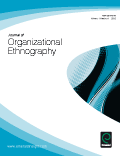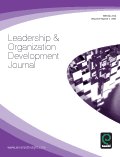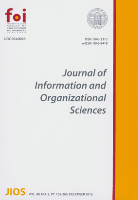
Journal of Organizational Ethnography
Scope & Guideline
Fostering Innovation Through Qualitative Exploration
Introduction
Aims and Scopes
- Ethnographic Research in Organizations:
The journal promotes the use of ethnographic methodologies to explore and analyze organizational settings, providing deep insights into the lived experiences of individuals within these contexts. - Interdisciplinary Approaches:
It encourages interdisciplinary research that integrates perspectives from sociology, anthropology, and organizational studies, fostering a rich dialogue among various fields. - Reflexivity and Autoethnography:
A significant emphasis is placed on reflexivity in research, with many contributions leveraging autoethnographic approaches to reflect on personal and professional identities within organizational frameworks. - Cultural and Social Dynamics:
The journal addresses the complexities of cultural and social dynamics within organizations, examining how these factors influence organizational behavior and decision-making. - Emerging Topics in Organizational Studies:
It actively seeks to publish work on emerging themes in organizational studies, including the impact of technology, new work arrangements, and social crises on organizational practices.
Trending and Emerging
- Digital and Remote Ethnography:
With the rise of remote work and digital interactions, there is a growing interest in digital ethnography, exploring how organizational culture and practices adapt to virtual environments. - Intersectionality in Organizational Studies:
Recent publications highlight the importance of intersectionality, examining how various social identities intersect within organizational contexts, influencing experiences and power dynamics. - Activism and Social Change:
A notable trend is the exploration of activism within organizations, focusing on how employees and stakeholders mobilize for social change and navigate institutional constraints. - Emotional and Affective Dimensions:
Research increasingly addresses the emotional and affective dimensions of organizational life, examining how emotions shape interactions, decision-making, and organizational culture. - Sustainability and Ethics in Organizations:
There is a rising focus on sustainability practices and ethical considerations in organizational research, reflecting a broader societal concern for responsible governance and corporate social responsibility.
Declining or Waning
- Traditional Organizational Structures:
There has been a noticeable decrease in studies focused on traditional hierarchical organizational structures, as researchers increasingly explore more fluid and networked forms of organization. - Static Methodological Approaches:
The journal has moved away from rigid methodological frameworks, with fewer publications adhering strictly to conventional ethnographic methods, favoring more flexible and adaptive approaches instead. - Focus on Formal Institutions:
Research centered on formal institutions and bureaucracies has diminished, as scholars shift their attention to informal practices, grassroots movements, and the role of social movements in organizations. - Single-Site Ethnography:
While single-site ethnography remains valuable, there has been a decline in its prevalence, with a growing preference for multisited and comparative ethnographic studies that capture broader organizational phenomena. - Quantitative Analysis in Ethnography:
The integration of quantitative methods within ethnographic research is becoming less common, as the journal emphasizes qualitative insights and narrative-driven analysis.
Similar Journals

JOURNAL OF CONTEMPORARY ETHNOGRAPHY
Engaging with the Pulse of Modern AnthropologyJOURNAL OF CONTEMPORARY ETHNOGRAPHY, an esteemed publication by SAGE PUBLICATIONS INC, is a leading journal that delves into the rich and dynamic field of ethnographic research. With a strong focus on anthropology, linguistics, sociology, and urban studies, this journal offers insights that are crucial for understanding contemporary social dynamics and cultural interactions. Established in 1972 and publishing continuously through significant eras of social change, the journal boasts an impressive Q1 ranking across multiple categories in the 2023 Scimago metrics, reflecting its prominence in the academic community. The journal holds a significant position, ranked #118 in Language and Linguistics and #67 in Anthropology within Scopus, showcasing its relevance and impact on both theory and practice. With no open access option, the journal dedicates itself to high-quality, peer-reviewed research that informs scholars and practitioners alike, underlining its importance as a reference point for advancing discussions in contemporary ethnography.

European Journal of Work and Organizational Psychology
Transforming workplaces with cutting-edge psychological insights.The European Journal of Work and Organizational Psychology, published by Routledge Journals, Taylor & Francis Ltd, stands at the forefront of research in the fields of Applied Psychology and Organizational Behavior. With a prestigious Q1 ranking in both categories as of 2023, this journal is highly regarded among scholars and practitioners alike for its rigorous, peer-reviewed articles that address critical issues within the workplace and organizational settings. Established in 2005, it continues to be a vital platform for disseminating innovative research and theories that influence contemporary practices in human resource management and organizational psychology. Although it does not operate under an open access model, its visibility and accessibility through various academic databases ensure significant engagement from its target audience. By fostering a deeper understanding of work dynamics, the journal underscores its commitment to elevating the dialogue about employee well-being, productivity, and organizational effectiveness, making it an essential resource for anyone invested in the future of work.

ADMINISTRATIVE SCIENCE QUARTERLY
Unveiling High-Impact Research in Administration and SocietyADMINISTRATIVE SCIENCE QUARTERLY, published by SAGE Publications Inc, is a prestigious journal in the fields of Public Administration, Sociology, Political Science, and Arts and Humanities. Established in 1975, this quarterly journal has maintained a reputation for excellence, as reflected in its 2023 Q1 category rankings, where it stands at the forefront of associated disciplines, holding the 1st rank in Arts and Humanities (miscellaneous), Public Administration, and 2nd in Sociology and Political Science. With an impressive Scopus ranking, particularly a 99th percentile in both Sociology and Public Administration, the journal serves as an essential platform for researchers and practitioners looking to advance theoretical and practical knowledge in administrative science. Although not open access, the journal provides exclusive access to a wealth of high-impact research, making it an invaluable resource for those in academia and beyond. The journal's commitment to scholarly rigor and its extensive coverage from 1975 to 2024 underscore its significance in shaping contemporary discourse and policy in the administrative domain.

GIO-Gruppe-Interaktion-Organisation-Zeitschrift fuer Angewandte Organisationspsychologie
Unraveling the Complexities of Applied Psychology in OrganizationsWelcome to the GIO-Gruppe-Interaktion-Organisation-Zeitschrift fuer Angewandte Organisationspsychologie, an esteemed journal dedicated to the domain of applied organizational psychology. Published by SPRINGER VIEWEG-SPRINGER FACHMEDIEN WIESBADEN GMBH, this journal provides a vital platform for researchers and practitioners alike to explore the intricacies of group interaction, organizational behavior, and various psychological frameworks influencing educational and developmental settings. With an impressive category quartile of Q3 in multiple psychological categories as of 2023, the journal underscores its commitment to advancing knowledge in areas such as organizational behavior and human resource management, making it a pivotal resource for professionals seeking the latest insights in these fields. Spanning from 2016 to 2024, the journal aims to foster a deeper understanding of applied psychology in organizational contexts, while contributing to impactful research and practices that shape the workforce of tomorrow. Although not currently open access, the journal serves as a beacon for academic excellence and a hub for transformative ideas in psychology.

LEADERSHIP & ORGANIZATION DEVELOPMENT JOURNAL
Unveiling the Future of Leadership and Organizational GrowthLEADERSHIP & ORGANIZATION DEVELOPMENT JOURNAL is a premier scholarly publication dedicated to exploring transformative leadership practices and their implications for organizational development. Published by Emerald Group Publishing Ltd in the United Kingdom, this journal has established itself as a vital resource in the fields of Business, Management, and Organizational Behavior. With a notable impact factor and recognized status as a Q1 journal in both Business, Management, and Accounting (miscellaneous) and Organizational Behavior and Human Resource Management, it serves as an authoritative platform for cutting-edge research from 1980 to 2024. The journal invites contributions that enhance understanding of effective leadership and strategic management, providing invaluable insights for researchers, professionals, and students alike. Though it does not offer open access, its rigorous peer-review process ensures that published articles maintain the highest academic standards, making it an essential resource for those aiming to excel in the dynamic field of organizational studies.

Journal of Organisational Studies and Innovation
Empowering research that shapes modern enterprises.Journal of Organisational Studies and Innovation is a pivotal academic platform dedicated to advancing the fields of organizational studies and innovation management. Published by MANAGEMENT & BUSINESS ACAD, this journal aims to facilitate a deeper understanding of the complexities of organizational behavior and the dynamics of innovation within modern enterprises. With an ISSN of 2056-9122 and an E-ISSN of 2056-9130, it caters to a diverse audience of researchers, professionals, and academics by providing open access to high-quality peer-reviewed articles. The journal seeks to explore critical themes such as organizational change, leadership styles, and the implications of innovation on productivity, thereby contributing significantly to the discourse in management and business studies. In a rapidly evolving economic landscape, the Journal of Organisational Studies and Innovation plays a vital role in disseminating knowledge that informs best practices and fosters innovative solutions across various sectors.

Journal of Organizational Effectiveness-People and Performance
Advancing Knowledge for Organizational SuccessThe Journal of Organizational Effectiveness-People and Performance, published by Emerald Group Publishing Ltd, stands as a leading platform in the field of Organizational Behavior and Human Resource Management. With an ISSN of 2051-6614 and an E-ISSN of 2051-6622, this journal has made significant strides since its inception in 2014, currently accumulating a valuable H-index that reflects its scholarly impact. Recognized as a Q2 journal in the 2023 rankings, it holds a commendable position at rank #71/230 in its category, with a percentile ranking of 69. The journal critically explores the intersection of people and performance within organizations, aiming to disseminate high-quality research and practical insights that drive effective organizational strategies. Researchers, practitioners, and students alike will find a wealth of resources and groundbreaking studies aimed at enhancing workforce dynamics and overall organizational effectiveness. The journal is dedicated to fostering knowledge that empowers individuals and organizations globally, making it an essential read for anyone vested in understanding the complexities of human resource practices and organizational success.

Qualitative Research in Organizations and Management
Illuminating the Qualitative Landscape of OrganizationsQualitative Research in Organizations and Management, published by EMERALD GROUP PUBLISHING LTD, is a leading journal that delves into the intricacies of qualitative research within the broad spectrum of organizational studies. With an ISSN of 1746-5648 and E-ISSN 1746-5656, this journal has been pivotal since its inception in 2001, continuing its contributions through 2024. It is highly regarded within its field, achieving a Q2 ranking in both Business, Management and Accounting and Organizational Behavior and Human Resource Management as of 2023. By offering a platform for innovative qualitative methodologies and theoretical frameworks, the journal fosters a rich dialogue among researchers, practitioners, and students interested in enhancing organizational effectiveness and understanding human resource dynamics. While currently not an open-access journal, the valuable insights and research findings published here are instrumental for anyone aiming to deepen their understanding of organizational behavior and management practices in today’s complex work environments.

Annual Review of Organizational Psychology and Organizational Behavior
Connecting theory and practice in organizational psychology.Welcome to the Annual Review of Organizational Psychology and Organizational Behavior, a premier journal published by Annual Reviews that serves as an essential resource for researchers, practitioners, and students in the fields of organizational psychology, behavior, and management. Since its inception in 2014, this journal has made significant strides in advancing scholarly discourse, evidenced by its impressive Q1 rankings across multiple categories, including Applied Psychology, Organizational Behavior and Human Resource Management, and Social Psychology. Widely recognized for its rigorous review process and high-impact contributions—boasting a notable 99th percentile ranking in Scopus for its fields—this journal is dedicated to publishing cutting-edge research that explores contemporary issues and innovations within organizational settings. Although it operates under a traditional subscription model, the journal's extensive collection of articles is invaluable for anyone seeking to deepen their understanding of organizational dynamics and enhance their practical applications in the workplace.

Journal of Information and Organizational Sciences
Bridging theory and practice in a digital age.Journal of Information and Organizational Sciences, published by the University of Zagreb, Faculty of Organization and Informatics, serves as a vital platform in the fields of computer science applications, information systems, and library and information sciences. Since its inception in 2006 as an Open Access journal, it has fostered an inclusive environment for researchers, professionals, and students to engage with the latest scholarly work. With ISSN 1846-3312 and E-ISSN 1846-9418, the journal features diverse studies that contribute to our understanding of organizational dynamics and informatization processes. Although currently categorized in the Q4 and Q3 quartiles across its related fields, the journal's commitment to academic rigor and accessibility aims to inspire greater impact in the scholarly community globally. Positioned in the picturesque city of Varazdin, Croatia, it continues to welcome innovative research that confronts contemporary challenges in information and organizational sciences, thus enhancing its pivotal role in bridging theoretical frameworks with practical applications.